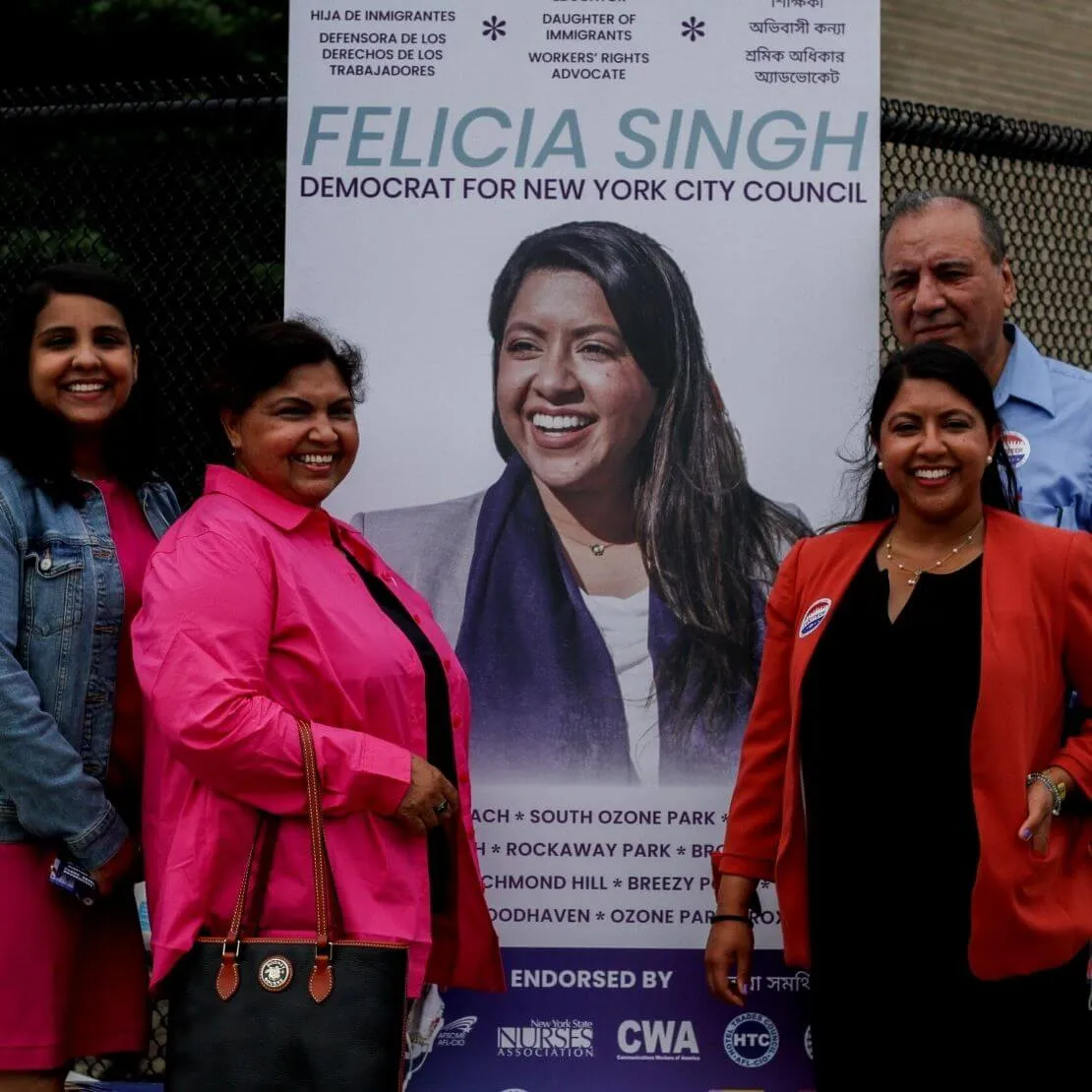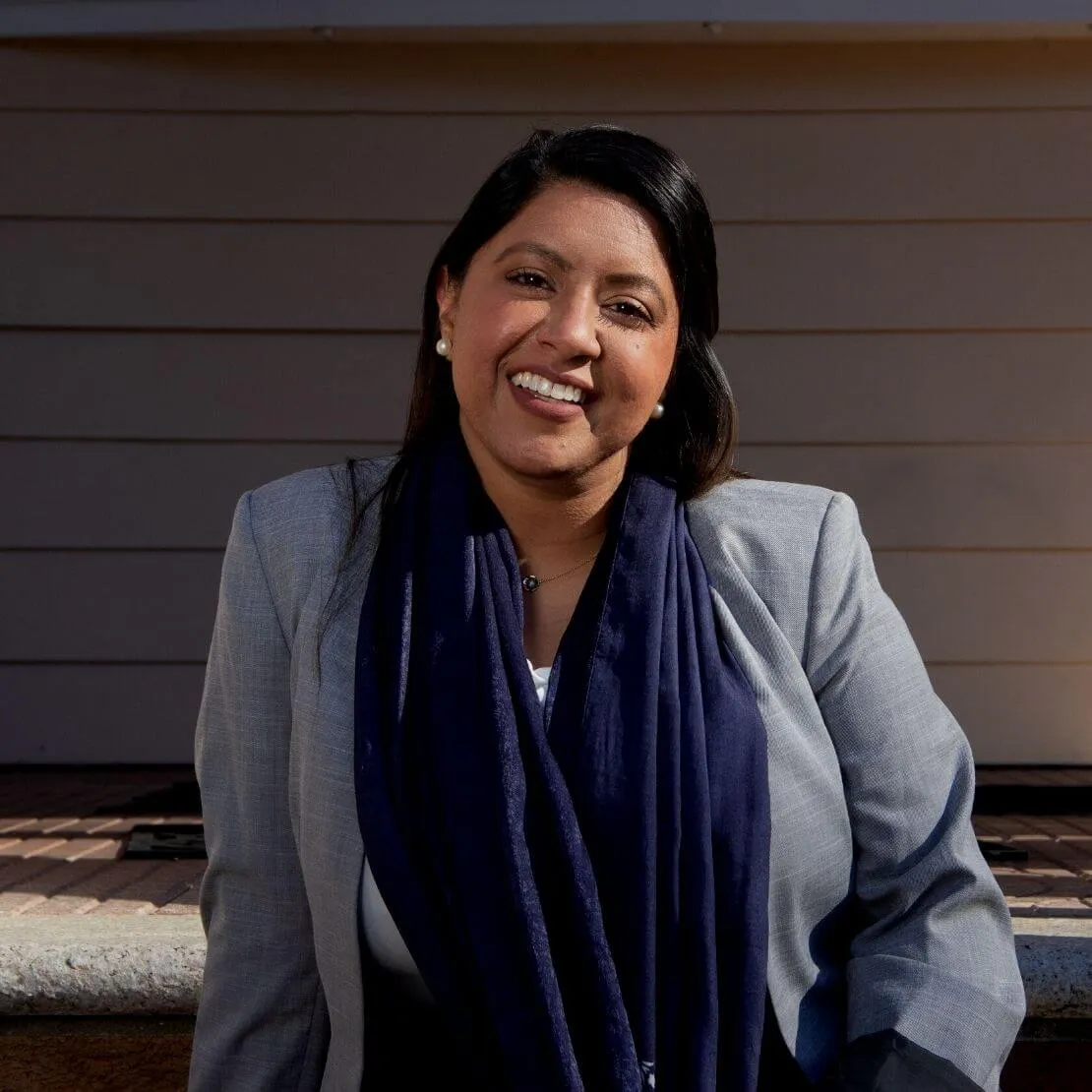No Punjabi or Guyanese person has ever won a City Council Democratic primary
New York’s District 32 is witnessing the historic city council race of Felicia Singh, teacher and daughter of working-class immigrants working to unseat a Trump Republican in November. This is the last Republican-held city council seat in Queens. Felicia is Punjabi and Guyanese, Sikh and Muslim, and brings her intercultural ethos to her campaign. No Punjabi or Guyanese person has ever won a City Council Democratic primary. A Democrat has not won this race in a while, although registered Democrats outnumber Republicans by about 3:1. Amid the exciting rise of an entire cohort of Asian city councilors, I spoke to Felicia for South Asian Today to learn more about her historic candidacy.
Felicia’s win would truly be a historic milestone for the South Asian community, yet she has carefully made sure not to run on a platform of identity politics. While her Indian identity matters to many voters, it’s not enough. “What was a motivator is that I was a teacher and I’m a daughter of working-class immigrants. It resonated with people across all racial lines,” Felicia said. Her intercultural, interfaith background is unique in South Asian communities, and she also spoke of the need for unified advocacy rather than deep biases between different South Asian groups.
While Felicia did not start out in politics, she taught for over a decade including her service as a teacher in the Peace Corps. “When I came back [from serving in the Peace Corps], I wanted to continue to do something in a place where I was raised. I got involved in my community,” Felicia said.
The problem of (lack of) representation immediately reared its head when Felicia forayed into local politics. “I walked into my first civic association meeting, and no one looked like me -- no one was my age either. Someone thought I was a journalist,” Felicia said. “I could have made the decision to leave [because] I didn’t feel like I was wanted in that space. But I wanted to keep coming back, showing up is a form of resistance.” Felicia ended up running for Vice-President, and winning. In October 2019, she made the similarly bold decision to run for public office.

Felicia’s father is a taxi cab driver, and her working class background informs her deep understanding of what issues matter most to voters. “I almost lost my home to the medallion crisis,” Felicia said. “During the pandemic, when taxi drivers could barely make enough money for one day, that wasn’t enough [for our city to act].” Felicia spoke of the importance of coalition building from the city to the state level, to push for budgeting on behalf of gig workers and taxi drivers.
Felicia’s campaign expanded the electorate by over 4,000 votes in a district with some of the lowest turnout rates in Queens. Her base consisted of all ages, people of colour, and low-resourced communities. Kristina Teschner, Felicia’s communications director, said that the coalition is as diverse as the district, and includes community organisations and labor unions. Felicia has racked up around 60 endorsements from electeds and other groups.
One of the main reasons Felicia won the primary is that she was able to turn out new voters. “There are people who told us that no one had ever knocked on their door before,” Kristina recalled. “But now people recognise our field director. Reaching a voting bloc that is not even registered is a part of our strategy -- empowering people with their own political power and voices, really making sure that they have access to all the information they need to participate in the political process.”
Despite the challenges of conducting a virtual, and later hybrid, campaign, Felicia got to the doors. “What we gave people was this deep pull to show up to the polls,” Felicia said. While a traditional campaign would advise convincing people to rank you 1 or 2, Felicia’s campaign decided to prioritize low EDs -- a risky but rewarding move. “We’re going to take care of our community members who had never been seen before… [their] needs have been ignored by our elected officials,” Felicia said. “We did something deeply historical.”
Running against a Trump Republican, Felicia is focused on coalition-building with other candidates. “I know that I have to co-sponsor bills with other people, I have to build budgets with so many other city council members, and advocate for my community. My opponents haven’t done this coalition building that I’ve already done.” Especially because of the upcoming redistricting in 2023, building these deep alliances is crucial.

Felicia pointed out that the campaign’s strategy is not just turning out a base of people who already align on all the issues. “It’s going to be a lot of reaching across the aisle,” she said. “Making sure our base turns out, talking to folks who are democratically moderate about public safety…. Teaching and learning with people who may have written me off before.”
Public safety is a hot button issue that elicits a lot of pushback, especially when it comes to envisioning community safety without police. For voters who disagree with her stance, Felicia encouraged them to rank her #2 in the primary. However, there is no ranked choice voting in the general election, which is pushing the campaign to ensure that voters have a full understanding of the platform. When asking various communities what makes them feel safe, not a single person indicated police, instead noting things like pedestrian safety, reliable transportation, and school funding. Felicia determinedly stated that fearmongering, a tactic used by right-wing politicians who have traditionally held power is a tool that may not be as effective in a rapidly changing community.
Felicia’s commitment to anti-racism is demonstrated by the strong language justice in her campaign, which pays people to translate and phonebank in multiple languages including Bengali, Chinese, and Polish. When a community member reached out to Felicia to tell her her entire building spoke Polish, the campaign mobilised to give her the resources she needed to canvass in Polish. “That was so moving for people,” Felicia said. “Creating that accessibility is so important because that’s how our communities are seen, and that gives them an invitation,” Kristina said that all of the campaign’s videos are captioned. She indicated that these practices will continue when Felicia is in office.
Felicia’s campaign is ignited by something bigger than the Republican challenge. “This is so much bigger than the campaign because it is coming from an organizing perspective,” Kristina said. “It’s about making sure people are able to lead in their own communities. Campaigns come and go, it’s about empowering people with the tools they need to advocate for themselves.”
Felicia wants her office to be a space where her communities can organise and build, figuring problems out together. “I want to be someone who’s accessible in that way,” she explained. This vision inspires her to persist, despite challenges such as racism as well as exclusion from some South Asian spaces. Just thinking about knocking doors in person again put a big smile on Felicia’s face. “All I can think about is being able to see my community. I met one of them during a fundraiser [recently] and she told me she felt so seen. I was so deeply moved by that. So many people feel so deeply seen.”